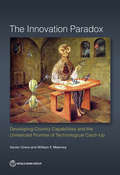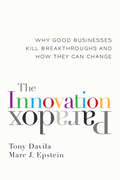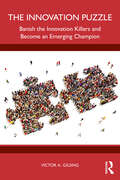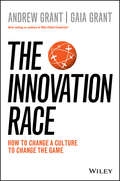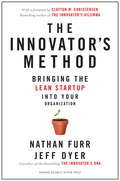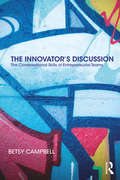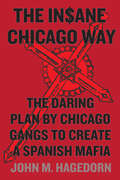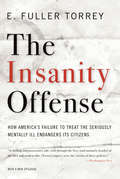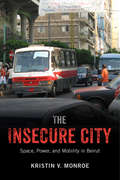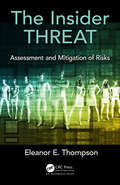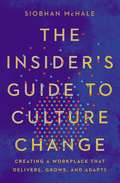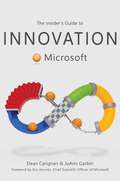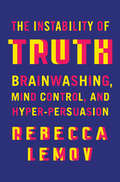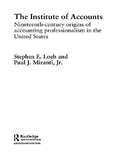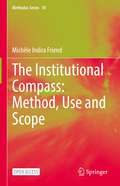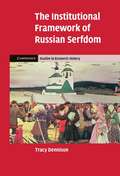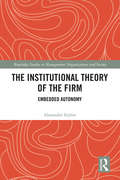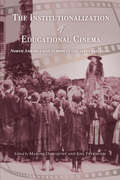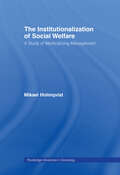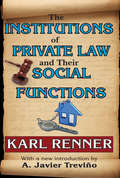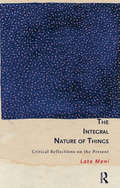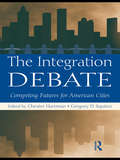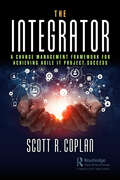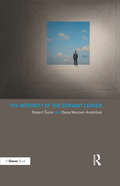- Table View
- List View
The Innovation Paradox: Developing-Country Capabilities and the Unrealized Promise of Technological Catch-Up
by William F. Maloney Xavier CireraSince Schumpeter, economists have argued that vast productivity gains can be achieved by investing in innovation and technological catch-up. Yet, as this volume documents, developing country firms and governments invest little to realize this potential, which dwarfs international aid flows. Using new data and original analytics, the authors uncover the key to this innovation paradox in the lack of complementary physical and human capital factors, particularly firm managerial capabilities, that are needed to reap the returns to innovation investments. Hence, countries need to rebalance policy away from R and D-centered initiatives †“ which are likely to fail in the absence of sophisticated private sector partners †“ toward building firm capabilities, and embrace an expanded concept of the National Innovation System that incorporates a broader range of market and systemic failures. The authors offer guidance on how to navigate the resulting innovation policy dilemma: as the need to redress these additional failures increases with distance from the frontier, government capabilities to formulate and implement the policy mix become weaker. This book is the first volume of the World Bank Productivity Project, which seeks to bring frontier thinking on the measurement and determinants of productivity to global policy makers.
The Innovation Paradox: Why Good Businesses Kill Breakthroughs and How They Can Change
by Tony Davila Marc EpsteinFor more than twenty years, major innovations—the kind that transform industries and even societies—seem to have come almost exclusively from startups, despite massive efforts and millions of dollars spent by established companies. Tony Davila and Marc Epstein, authors of the bestselling Making Innovation Work, say the problem is that the very processes and structures responsible for established companies’ enduring success prevent them from developing breakthroughs. This is the innovation paradox. Most established companies succeed through incremental innovation—taking a product they’re known for and adding a feature here, cutting a cost there. Major breakthroughs are hard to achieve when everything about the way your organization is built and run is designed to reward making what already works work a little better. But incremental innovation can coexist with breakthrough thinking. Using examples from both scrappy startups and long-term innovators such as IBM, 3M, Apple, and Google, Davila and Epstein explain how corporate culture, leadership style, strategy, incentives, and management systems can be structured to encourage breakthroughs. Then they bring it all together in a new model called the Startup Corporation, which combines the philosophy of the startup with the experience, resources, and network of an established company. Breakthrough innovation no longer has to be the nearly exclusive province of the new kids on the block. With Davila and Epstein’s assistance, any company can develop paradigm-shifting products and services and maximize the ROI on its R&D.
The Innovation Puzzle: Banish the Innovation Killers and Become an Emerging Champion
by Victor GilsingBeyond a generic innovation toolkit, this book dissects the hidden biases and behavioral traps that too often doom innovation within companies to failure. It takes the reader on a journey to learn how to banish these innovation killers for good and turn their company into an innovation champion. In The Innovation Puzzle, Professor Victor A. Gilsing reveals that in most cases, these outcomes cannot be blamed on a lack of funding or a failure to follow innovation gurus’ playbooks. Often, the real problem is that companies unwittingly build hidden barriers to innovation within themselves. From the systems they use to structure and monitor their business units to their hiring and promotion policies, not to mention their executives’ leadership styles. Many of these processes and practices underpinning their core business activities end up depriving innovation of the time, space, vision, talents, and perseverance it needs to succeed. Building on this insight, The Innovation Puzzle helps readers identify and remove these barriers within their own firms. Rather than one-size-fits-all solutions, this volume offers instructive real-world examples. It provides practical, visually rich, and easy-to-apply tools that guide readers toward the measures that will transform their company from a follower into a leader in innovation. Perfect for executives and board members as well as for innovation talents and their managers, The Innovation Puzzle is the key that will unlock the expertise, innovation ambitions, and inspiration your firm needs to realize its true innovation potential and become an innovation champion.
The Innovation Race: How to change a culture to change the game
by Andrew Grant Gaia GrantIf innovation is a race: Who wins? Who loses? Who gets eliminated? - and how is it possible to stay ahead of the game? The Innovation Race takes readers on a lively global adventure to explore the current state of innovation. Along the way best-selling authors Andrew and Gaia Grant search for clues on how to stay ahead in the race and design a more sustainable future. Asking the critical questions - Why do we innovate? Are we at risk of innovating for the sake of innovation? What could we be doing better? - the Grants reflect on whether, if in the race to come up with 'the next big thing,' we may be losing the purpose behind the process. They then outline how to navigate the key paradoxical challenges that can either frustrate or fuel innovation to change the game. By taking the latest academic research and presenting it in an accessible way, the Grants present a compelling case for forging a new path for the future. The Innovation Race provides concrete strategies to support purpose-driven sustainable innovation through deep cultural transformation. A unique profiling tool reveals current organisation positioning along with potential opportunities and challenges. A practical culture change model then provides clear direction for proactive change. With economists estimating that up to 80 per cent of growth comes from new ideas and innovations, this thought-provoking book provides the strategies and tools to learn how to create an innovation culture for long term success. Identify your own sweet spot for innovative thinking Learn the strategies to transform your organisation Engage and motivate employees toward innovative action Excel in implementing a deep cultural shift The Innovation Race will make you reassess what you assumed you knew about innovation, help boost the innovation process to new levels and bring your organisation to the forefront.
The Innovator's Method: Bringing the Lean Start-up into Your Organization
by Jeff Dyer Nathan FurrHave you ever come up with an idea for a new product or service but didn’t take any action because you thought it would be too risky? Or at work, have you had what you thought could be a big idea for your company-perhaps changing the way you develop or distribute a product, provide customer service, or hire and train your employees? If you have, but you haven’t known how to take the next step, you need to understand what the authors call the innovator’s method-a set of tools emerging from lean start-up, design thinking, and agile software development that are revolutionizing how new ideas are created, refined, and brought to market. To date these tools have helped entrepreneurs, designers, and software developers manage uncertainty-through cheap and rapid experiments that systematically lower failure rates and risk. But many managers and leaders struggle to apply these powerful tools within their organizations, as they often run counter to traditional managerial thinking and practice. Authors Nathan Furr and Jeff Dyer wrote this book to address that very problem. Following the breakout success of The Innovator’s DNA-which Dyer wrote with Hal Gregersen and bestselling author Clay Christensen to provide a framework for generating ideas-this book shows how to make those ideas actually happen, to commercialize them for success. Based on their research inside corporations and successful start-ups, Furr and Dyer developed the innovator’s method, an end-to-end process for creating, refining, and bringing ideas to market. They show when and how to apply the tools of their method, how to adapt them to your business, and how to answer commonly asked questions about the method itself, including: How do we know if this idea is worth pursuing? Have we found the right solution? What is the best business model for this new offering? This book focuses on the "how”-how to test, how to validate, and how to commercialize ideas with the lean, design, and agile techniques successful start-ups use. Whether you’re launching a start-up, leading an established one, or simply working to get a new product off the ground in an existing company, this book is for you.
The Innovator’s Discussion: The Conversational Skills of Entrepreneurial Teams
by Betsy CampbellThis book describes the conversational competencies that enable innovative entrepreneurial teams to create new products and ventures, and it presents several exercises and games to help readers master these conversational moves. Based on 6 years of detailed empirical analysis of teams at the forefront of technological breakthroughs and new venture creation, this book shows you how high-performance teams verbally accomplish their work. Through engaging examples, exercises, and descriptions, it enables entrepreneurs to develop the conversational competencies that can help them create new products and ventures. The book includes a technique for making interpretation visible that enables teams to navigate pivots in the innovation process. It also includes the materials and instructions for the Toasted Marshmallow game designed to help entrepreneurial teams fail forward. The Innovator’s Discussion enables readers and their team mates to build a conversational advantage. The reader will gain both a practical and theoretical understanding of the role of conversation in the context of entrepreneurial work. It is invaluable for aspiring and established entrepreneurs as well as for educators and those wanting to learn more about entrepreneurship, innovation, and high-performance teams.
The Insane Chicago Way: The Daring Plan by Chicago Gangs to Create a Spanish Mafia
by John M. HagedornThe Insane Chicago Way is the untold story of a daring plan by Chicago gangs in the 1990s to create a Spanish Mafia--and why it failed. John M. Hagedorn traces how Chicago Latino gang leaders, following in Al Capone's footsteps, built a sophisticated organization dedicated to organizing crime and reducing violence. His lively stories of extensive cross-neighborhood gang organization, tales of police/gang corruption, and discovery of covert gang connections to Chicago's Mafia challenge conventional wisdom and offer lessons for the control of violence today. The book centers on the secret history of Spanish Growth & Development (SGD)--an organization of Latino gangs founded in 1989 and modeled on the Mafia's nationwide Commission. It also tells a story within a story of the criminal exploits of the C-Note$, the "minor league" team of the Chicago's Mafia (called the "Outfit"), which influenced the direction of SGD. Hagedorn's tale is based on three years of interviews with an Outfit soldier as well as access to SGD's constitution and other secret documents, which he supplements with interviews of key SGD leaders, court records, and newspaper accounts. The result is a stunning, heretofore unknown history of the grand ambitions of Chicago gang leaders that ultimately led to SGD's shocking collapse in a pool of blood on the steps of a gang-organized peace conference. The Insane Chicago Way is a compelling history of the lives and deaths of Chicago gang leaders. At the same time it is a sociological tour de force that warns of the dangers of organized crime while arguing that today's relative disorganization of gangs presents opportunities for intervention and reductions in violence.
The Insanity Offense: How America's Failure to Treat the Seriously Mentally Ill Endangers Its Citizens
by E. Fuller Torrey"Vital for all working in the mental health field . . . . Fascinating reading for anyone." --Choice E. Fuller Torrey, the author of the definitive guides to schizophrenia and manic depression, chronicles a disastrous swing in the balance of civil rights that has resulted in numerous violent episodes and left a vulnerable population of mentally ill people homeless and victimized. Interweaving in-depth accounts of landmark cases in California, Wisconsin, and North Carolina with a history of legislation and changes in the mental health care system, Torrey gives shape to the magnitude of our failure and outlines what needs to be done to reverse this ongoing--and accelerating--disaster. A new epilogue on the 2011 shooting in Tucson, Arizona, brings this tragic story up to date.
The Insecure City: Space, Power, and Mobility in Beirut
by Kristin V. MonroeFifteen years after the end of a protracted civil and regional war, Beirut broke out in violence once again, forcing residents to contend with many forms of insecurity, amid an often violent political and economic landscape. Providing a picture of what ordinary life is like for urban dwellers surviving sectarian violence, The Insecure City captures the day-to-day experiences of citizens of Beirut moving through a war-torn landscape. While living in Beirut, Kristin Monroe conducted interviews with a diverse group of residents of the city. She found that when people spoke about getting around in Beirut, they were also expressing larger concerns about social, political, and economic life. It was not only violence that threatened Beirut's ordinary residents, but also class dynamics that made life even more precarious. For instance, the installation of checkpoints and the rerouting of traffic--set up for the security of the elite--forced the less fortunate to alter their lives in ways that made them more at risk. Similarly, the ability to pass through security blockades often had to do with an individual's visible markers of class, such as clothing, hairstyle, and type of car. Monroe examines how understandings and practices of spatial mobility in the city reflect social differences, and how such experiences led residents to be bitterly critical of their government. In The Insecure City, Monroe takes urban anthropology in a new and meaningful direction, discussing traffic in the Middle East to show that when people move through Beirut they are experiencing the intersection of citizen and state, of the more and less privileged, and, in general, the city's politically polarized geography.
The Insider Threat: Assessment and Mitigation of Risks
by Eleanor E. ThompsonThis book provides emergent knowledge relating to physical, cyber, and human risk mitigation in a practical and readable approach for the corporate environment. It presents and discusses practical applications of risk management techniques along with useable practical policy change options. This practical organizational security management approach examines multiple aspects of security to protect against physical, cyber, and human risk. A practical more tactical focus includes managing vulnerabilities and applying countermeasures. The book guides readers to a greater depth of understanding and action-oriented options.
The Insider's Guide to Culture Change: Creating a Workplace That Delivers, Grows, and Adapts
by Siobhan McHaleCulture transformation expert Siobhan McHale defines culture simply: &“It&’s how things work around here.&” The secret to the success or failure of any business boils down to its culture.From disengaged employees to underserved customers, business failures invariably stem from a culture problem. In The Insider&’s Guide to Culture Change, acclaimed culture transformation expert and global executive Siobhan McHale shares her proven four-step process to demystifying culture transformation and starting down the path to positive change.Many leaders and managers struggle to get a handle on exactly what culture is and how pervasive its impact is throughout an organization. Some try to change the culture by publishing a statement of core values but soon find that no meaningful change happens.Others try to unify the culture around a set of shared goals that satisfy shareholders but find their efforts backfire as stressed employees throw their hands up because &“leadership just doesn&’t get it.&” Others implement expensive new IT systems to try to bring about change, only to find that employees find &“workarounds&” and soon go back to their old ways.The Insider&’s Guide to Culture Change walks readers through McHale&’s four-step process to culture transformation, including how to:Understand what &“corporate culture&” really is and how it impacts every aspect of the way your organization operatesAnalyze where your culture is broken or not adding maximum valueUnlock the power of reframing roles within your company to empower and engage your employeesUtilize proven methods and tools to break through deeply embedded patterns and change your company mind-setKeep the momentum going by consolidating gains and maintaining your foot on the change acceleratorWith The Insider&’s Guide to Culture Change, watch your employees go from followers to change leaders who drive an agile culture that constantly outperforms.
The Insider's Guide to Innovation at Microsoft
by Dean Carignan JoAnn GarbinIn this unique guide, you&’re not just reading about innovation—you're learning how to do it from the people behind some of the biggest breakthroughs of the last 50 years at one of the most influential and valuable companies in the world.Are there innovation truisms that hold from one initiative to the next? Are there strategies that appear again and again in the success stories of businesses as varied as gaming and cloud infrastructure? Are there behaviors common to creative leadership in every role, from research to sales? And if these patterns exist, could they be distilled into teachable practices? These are the questions Dean Carignan and JoAnn Garbin, two senior innovation leaders at Microsoft, set out to answer. The Insider&’s Guide to Innovation at Microsoft reveals the patterns behind Microsoft&’s biggest wins and losses—from the Xbox revolution to the Windows Mobile miss and the unexpected rise of Bing in AI. Based on dozens of interviews only fellow &“Microsofties&” could secure, this book shares behind-the-scenes stories brimming with insights and proven practices that transcend time and technology.
The Instability of Truth: Brainwashing, Mind Control, and Hyper-Persuasion
by Rebecca LemovAn acclaimed historian of science uncovers the hidden history of brainwashing—and its troubling implications for today. Because brainwashing affects both the world and our observation of the world, we often don’t recognize it while it’s happening—unless we know where to look. As Rebecca Lemov writes in The Instability of Truth, “Brainwashing erases itself.” What we call brainwashing is more common than we think; it is not so much what happens to other people as what can happen to anyone. The Instability of Truth exposes the myriad ways our minds can be controlled against our will, from the brainwashing techniques used against American POWs in North Korea to the “soft” brainwashing of social media doomscrolling and behavior-shaping. In our increasingly data-driven world, anyone can fall victim to mind control. Lemov identifies invasive forms of emotional engineering that exploit trauma and addiction to coerce and persuade in everyday life. Tracing the word “brainwashing” from deep in the files of an operative of the U.S. Office of Strategic Services in the 1950s to the pioneering research of Robert Jay Lifton, to the public trials of cult leaders and the case of Patty Hearst, Lemov also studies how the idea of mind control has spread across the globe and penetrated courtrooms, secret labs, military schools, and today’s digital sites. The Instability of Truth offers lessons from mind-control episodes past and present. Truth is always subject to question in more mundane walks of life than most people believe, and Lemov equips us for the increasing challenges we face from social media, AI, and an unprecedented, global form of surveillance capitalism. The Instability of Truth develops a rigorous new understanding of both brainwashing’s paradoxes and its emotional roots, by giving voice to brainwashers, the brainwashed, and third-party observers alike.
The Institute of Accounts (Routledge New Works In Accounting History Ser. #Vol. 1)
by Stephen E. Loeb Paul J. MirantiThis book focuses upon the Institute of Accounts (IA), an organization to which the modern United States accounting profession can trace its roots. The IA was organized in the early 1880s in New York City and, as discussed in this book, attracted a diverse membership that included some of the leading accounting thinkers of the period. The Institute
The Institutional Compass: Method, Use and Scope (Methodos Series #18)
by Michèle Indira FriendThis open access book presents a new generation multi-criteria, multi-stake holder, decision aide, called an "institutional compass". Based on hard data, the compass tells us what quality-direction we are heading in as an institution, region, system or organisation. The quality is not chosen from the usual scalar qualities of: good, neutral and bad. Instead, it is a quality chosen between: harmony, discipline and excitement. None is good in and of itself. We need some of each. The compass marks a new generation in four respects. 1. The representation of the data is intuitive and simple to understand, and therefore can be used to communicate and justify policy decisions. 2. Any data can be included, i.e., none is excluded. This makes the compass tailored to particular situations, voices and contexts. 3. The data includes different time horizons and different types of value: monetary, use, social, sentimental, religious, intrinsic, existential... 4. The process of compass construction can be made inclusive at several junctions. An institutional compass can be extended to evaluate products, add normativity to a systems analysis, reflect world-views such as that of ecological economists or function as an accounting system to manage scarce resources. There are four parts to the book. The first part introduces the general ideas behind the compass. In the second part, the author presents the method for constructing the compass. This includes data collection, data analysis and a mathematical formula to aggregate the data into a single holistic reading. In the third part, the author extends the methodology: to incorporate it into systems science, adding a normative and quality-direction dimension, to use it as a non-linear accounting method and more thoroughly to reflect the philosophy of ecological economists to give a real measure of sustainability. In the fourth part, we see three case studies: one for the World Health Organisation, a second is the use of the compass to label products in a shop and the third is as a regional compass for Hauts-de-France. The book ends with philosophical conclusions. Throughout the book, we see tight arguments, refreshing ideas and a thorough treatment of objectivity in decision making.
The Institutional Framework of Russian Serfdom
by Tracy DennisonRussian rural history has long been based on a 'Peasant Myth', originating with nineteenth-century Romantics and still accepted by many historians today. In this book, Tracy Dennison shows how Russian society looked from below, and finds nothing like the collective, redistributive and market-averse behaviour often attributed to Russian peasants. On the contrary, the Russian rural population was as integrated into regional and even national markets as many of its west European counterparts. Serfdom was a loose garment that enabled different landlords to shape economic institutions, especially property rights, in widely diverse ways. Highly coercive and backward regimes on some landlords' estates existed side-by-side with surprisingly liberal approximations to a rule of law. This book paints a vivid and colourful picture of the everyday reality of rural Russia before the 1861 abolition of serfdom.
The Institutional Theory of the Firm: Embedded Autonomy (Routledge Studies in Management, Organizations and Society)
by Alexander StyhreThe Institutional Theory of the Firm examines recent and previous organization theory literature to advocate what Evans (1995) refers to as the "embedded autonomy" of the firm, as well as its role in being simultaneously anchored in, for example, corporate legislation and regulatory practices on the national, regional (i.e., within the European Union) and transnational levels, while at the same time being granted the right to operate with significant degrees of freedom within this legal-regulatory model. Seen in this view, the embedded autonomy of the corporation represents a theoretical view of the corporation that complements the market-based image of the corporation in economic theory. When advocating the institutional theory model, three forms of embedded autonomy are examined. First, the corporation is enacted as a legal entity sui juris—as a freestanding "legal person" in corporate law and within the regulatory framework that serves to enforce legislation in everyday life settings. Second, the corporation is embedded within what social theorists refer to as moral economies, the norms and values that regulate what are the socially acceptable and legitimate means for conducting business. Third and finally, the corporation is embedded in governance, a relatively complex economic concept that denotes legal and regulatory control on the societal and economic system levels, and on the level of the individual corporation. By combining the three forms of embeddedness, sanctioned by law, norms, and governance, the embedded autonomy of the firm is secured on the basis of a variety of social practices and resources. This book brings together a diverse literature including management studies, economic sociology, legal theory, finance theory, and mainstream economic theory to advance the argument that the corporation is best understood as what is embedded in a social and economic context, yet best serving its defined and stipulated ends by assuming considerable degrees of freedom to operate in isolation from various stakeholders. It will be of relevance for a variety of readers, including graduate students, management scholars, policy-makers, and management consultants interested in organization theory and management studies.
The Institutionalization of Educational Cinema: North America and Europe in the 1910s and 1920s
by Marina Dahlquist and Joel FrykholmEssays by scholars on how film has been used by schools, libraries, governments, and organizations for educational purposes.The potential of films to educate has been crucial for the development of cinema intended to influence culture, and is as important as conceptions of film as a form of art, science, industry, or entertainment. Using the concept of institutionalization as a heuristic for generating new approaches to the history of educational cinema, contributors to this volume study the co-evolving discourses, cultural practices, technical standards, and institutional frameworks that transformed educational cinema from a convincing idea into an enduring genre. The Institutionalization of Educational Cinema examines the methods of production, distribution, and exhibition established for the use of educational films within institutions—such as schools, libraries, and industrial settings—in various national and international contexts and takes a close look at the networks of organizations, individuals, and government agencies that were created as a result of these films’ circulation. Through case studies of educational cinemas in different North American and European countries that explore various modes of institutionalization of educational film, this book highlights the wide range of vested interests that framed the birth of educational and nontheatrical cinema.
The Institutionalization of Educational Cinema: North America and Europe in the 1910s and 1920s
by Marina Dahlquist and Joel FrykholmEssays by scholars on how film has been used by schools, libraries, governments, and organizations for educational purposes.The potential of films to educate has been crucial for the development of cinema intended to influence culture, and is as important as conceptions of film as a form of art, science, industry, or entertainment. Using the concept of institutionalization as a heuristic for generating new approaches to the history of educational cinema, contributors to this volume study the co-evolving discourses, cultural practices, technical standards, and institutional frameworks that transformed educational cinema from a convincing idea into an enduring genre. The Institutionalization of Educational Cinema examines the methods of production, distribution, and exhibition established for the use of educational films within institutions—such as schools, libraries, and industrial settings—in various national and international contexts and takes a close look at the networks of organizations, individuals, and government agencies that were created as a result of these films’ circulation. Through case studies of educational cinemas in different North American and European countries that explore various modes of institutionalization of educational film, this book highlights the wide range of vested interests that framed the birth of educational and nontheatrical cinema.
The Institutionalization of Social Welfare: A Study of Medicalizing Management (Routledge Advances in Sociology #Vol. 30)
by Mikael HolmqvistToday most countries rely on formally organized welfare programs - in some cases to the extent that they are labeled "welfare states". These programs, which have been constructed over the last decades, make up a larger national and international system of good intentions. Overall, it appears inconceivable to imagine "civilized society" without a comprehensive organizational system of social welfare. Social welfare has become a "holy cow" in many societies; an institutionalized aspect of modern life. But how does the institutionalization of social welfare occur through the concrete activities it enacts; and why does the institutionalization of social welfare appear to be so particularly successful in relation to other institutionalizing phenomena? These are central problems for any sociological analysis of contemporary society’s organization and are the main locus of attention of this book. Holmqvist explores how a social welfare organization becomes a self-evident phenomenon by "medicalizing" its environment: a way of "solving" social problems by viewing and treating them as medical problems. This study generates new understandings of how institutionalization of organizations comes about and contributes fresh insight to the area of social welfare policies.
The Institutions of Private Law and Their Social Functions
by Eli GinzbergIn the English-speaking world, Karl Renner is by far the best-known among the Austro-Marxists who were active in the Austrian socialist movement during the first few decades of the twentieth century. Recognition of Renner's scholarship is due largely to the English translations of his works on Marxism, as well as to the secondary writings on his notions of socialist legality and national cultural autonomy.Renner has for over half a century been celebrated for the only book of his that has, to date, been wholly translated into English. It remains the classic socialist attempt to off er a realistic understanding of the role of the legal institution of private property in modern society: The Institutions of Private Law and Their Social Functions. In his introduction to this edition, A. Javier Trevii?1/2o discusses the volume's relevance for today, and briefly describes that aspect of Renner's life that occupied most of this time and energy: his involvement in Austrian social democratic politics.The substance of Renner's exposition remains intact. The text provides one of the best insights into the relationship between capitalism and property's economic functions. It emphasizes how this fundamental institution's application has, since the initial stage of finance capitalism, increased or diminished, been externally transformed, or inherently metamorphosed. In an age of unprecedented global financial crisis, emerging market countries, and increased government regulation, Trevii?1/2o suggests we would do well to heed the book's message. It might help us understand the complex situations we encounter today as we grapple with our hybrid identities as salaried workers and economic investors.
The Integral Nature of Things: Critical Reflections on the Present
by Lata ManiThe world is an interdependent whole of which everything is an integral, complexly related, part. Yet current ways of thinking, and being, persistently separate social phenomena and the individual self from the multiple dimensions with which they are interconnected. The Integral Nature of Things examines this revealing paradox and its consequences in a variety of sites: everyday language, labour, advertising, technology, post-structuralist theory, political rhetoric, urban planning, sex, neoliberal globalisation. Mani demonstrates how even though the interrelations between things are obscured by the ruling paradigm, the facts of relationality and indivisibility continually assert themselves. The book interweaves prose with poetry and sociocultural analysis with observational accounts to offer an alternative framework for addressing aspects of the cognitive, cultural, political, and ethical crisis we face today.
The Integration Debate: Competing Futures For American Cities
by Chester Hartman Gregory D. SquiresRacial integration, and policies intended to achieve greater integration, continue to generate controversy in the United States, with some of the most heated debates taking place among long-standing advocates of racial equality. Today, many nonwhites express what has been referred to as "integration exhaustion" as they question the value of integration in today’s world. And many whites exhibit what has been labeled "race fatigue," arguing that we have done enough to reconcile the races. Many policies have been implemented in efforts to open up traditionally restricted neighborhoods, while others have been designed to diversify traditionally poor, often nonwhite, neighborhoods. Still, racial segregation persists, along with the many social costs of such patterns of uneven development. This book explores both long-standing and emerging controversies over the nation’s ongoing struggles with discrimination and segregation. More urgently, it offers guidance on how these barriers can be overcome to achieve truly balanced and integrated living patterns.
The Integrator: A Change Management Framework for Achieving Agile IT Project Success
by Scott R. CoplanWhen a $145 million IT project failure pushes Los Angeles to the edge of financial meltdown, the County CEO asks Max McLellan, a harried IT project manager, aka The Integrator, for help. The County Board gives Max 30 days to identify the problem and find a solution. At first Max finds the usual missteps, but something bigger and darker beckons, an explosive source of project failure. He must do something different, rattling ghosts of previous County IT failures, uncloaking crookedness, and exposing truths that shatter careers. With some people rooting for his failure, Max battles to fit all the pieces together with the County team, applying his proven framework to define the problem, plan a solution and execute it successfully. It’s common knowledge that barely 50% of IT projects succeed, per a 2017 Project Management Institute report. Equally well-known, approximately 70% of large-scale change management initiatives fail according to a 2017 McKinsey & Co. report. Given the challenge to overcome these low success rates, The Integrator offers a proven narrative on the organizational change framework for achieving Agile IT project management success based on the author’s 45+ year client experiences and published research. The Integrator defines change management as the single overarching methodology integrating Agile IT and project management. It does this because all projects are about change – significant organizational and personal change. The people involved – their participation in and understanding and support of these changes – ultimately determine IT projects success or failure. In fact, while all IT projects are about change, successful projects change human behavior. The methodologies included in the framework, described in The Integrator, include: • Change management as defined by AIM (Accelerating Implementation Methodology). • Project management as defined by the Project Management Institute (PMI) Guide to the Project Management Body of Knowledge (PMBOK Guide) standard. • IT management as derived from the Institute of Electrical Engineers (IEEE) Guide to the Software Engineering Body of Knowledge (SWEBOK) standard. • Agile as defined by the Agile Alliance’s Agile Manifesto. Written by a certified Project Management Professional and accredited change management practitioner, The Integrator chronicles the challenges involved in applying this framework in a real-world setting to achieve successful project implementation.
The Integrity of the Servant Leader
by Robert Sumi Dana Mesner-AndolšekThe impact of the global financial crisis is still being felt today and the deeply unethical behaviour of the top level leaders at those economic and financial organizations, that were at the heart of the crisis, has served to highlight the importance of integrity, and in particular the need for servant leadership, if we are to avoid another major catastrophe in the management of both commercial and non-profit organizations. Servant leadership has many features in common with transformational leadership but is primarily focused on caring about employees and their personal development. Ethical behaviour is one of the most important components of successful leadership yet this remains insufficiently investigated, especially from an interdisciplinary perspective. With the help of theory, empirical analysis and the relevant methodological apparatus, the authors fill the gap in the analysis of integrity and its impact on leadership and locate the significant factors which affect integrity in general. They develop and assess the forces that impact Servant Leadership style, as well as the ability to engender trust. As a starting point they make two assumptions: An important element in leading is the ethical dimension of leadership; The ratio of factors that affect leading and the servant leadership style is complex, but the integrity of leaders is the most important among them. The authors examine four integrated scientific areas: ethics and business ethics, human resource management and psychology and focus on the analysis of the process of leadership and the factors within that process of leading that influence its success and its ethical dimension.
